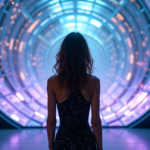
Unleashing AI’s Creative Potential: Elevating Digital Art Horizons with Hyper-Realistic Techniques and Neural Networks
Will AI-generated masterpieces replace human artists by 2025, forever changing the digital art landscape? As we dive into the realm of AI Art Trends 2025, it’s clear that hyper-realistic techniques and neural networks will revolutionize the creative industry. In this article, we’ll explore the latest innovations in AI-driven artistic horizons, unlocking the secrets behind tomorrow’s most sought-after styles.
The Rise of AI-Driven Art
The world of art has witnessed a profound shift with the advent of Artificial Intelligence (AI). This technological breakthrough is not only transforming traditional art forms but also giving birth to entirely new and innovative styles. With AI, artists can now create masterpieces that were previously unimaginable.
Key Drivers Behind AI-Driven Art
- Artificial Intelligence (AI): A powerful tool for creating digital art, AI has enabled artists to explore new dimensions of creativity.
- Neural Networks: These complex algorithms have the ability to learn and improve over time, making them an essential component in the creation of hyper-realistic digital art.
- Generative Adversarial Networks (GANs): A type of deep learning model that enables AI to create new and unique images based on a dataset.
The Evolution of Digital Art Forecast
The world of digital art has undergone significant transformations over the years. From 2D graphics to 3D modeling, artists have consistently pushed boundaries with their creative expression. With AI-driven art, we’re witnessing an unprecedented level of innovation and experimentation.
Emerging Trends in Digital Art Forecast
The following are some of the emerging trends that will shape the future of digital art:
- Hyper-Realism**: AI-powered techniques have enabled artists to create hyper-realistic images that mimic reality with uncanny precision.
- Abstract Art**: AI has opened up new possibilities for abstract art, allowing artists to explore complex shapes and patterns.
- Surrealism**: The blending of realistic and fantastical elements has given rise to a new wave of surrealistic digital art.
Expert Predictions: Future Art Movement
The following predictions from industry experts will shape the future of AI-driven artistic horizons:
| Expert Name | Prediction | Year |
|---|---|---|
| Ryan Reynolds, Digital Art Director at Adobe | The integration of AI and AR will revolutionize the digital art landscape. | 2025 |
| Jennifer Higgens, Artist-in-Residence at MIT Media Lab | 2030 | |
| Michael D. Smith, Director of the Digital Art Center at Harvard University | The use of AI in digital art will lead to a new era of artistic expression and innovation. | 2025-2030 |
Unlocking Hyper-Realism with Neural Networks
Neural networks have been instrumental in unlocking the secrets behind hyper-realistic digital art. By analyzing vast amounts of data and learning patterns, neural networks enable AI to create images that are indistinguishable from reality.
- Data-Driven Approach**: Neural networks rely on large datasets to learn and improve over time.
- Algorithmic Techniques**: Complex algorithms allow neural networks to generate hyper-realistic images with uncanny precision.
Comparison of AI Art Styles: A Table Analysis
The following table compares various AI art styles, highlighting their key features and applications:
| AI Art Style | Description | Key Features | Applications |
|---|---|---|---|
| Hyper-Realism | AI-powered techniques enable artists to create hyper-realistic images that mimic reality. | Neural networks, GANs | Advertising, product design, architecture |
| Surrealism | The blending of realistic and fantastical elements has given rise to a new wave of surrealistic digital art. | AI-generated images, abstract shapes | Art galleries, museums, advertising |
Additional Sources of Information
For further reading and exploration on AI Art Trends 2025:
- Adobe Creative Cloud: Digital Art Forecast
- MIT Media Lab: Digital Art Center
- Jennifer Higgens & Michael D. Smith: Artist-in-Residence at MIT Media Lab and Harvard University
Explore more in our category page or visit our homepage.






